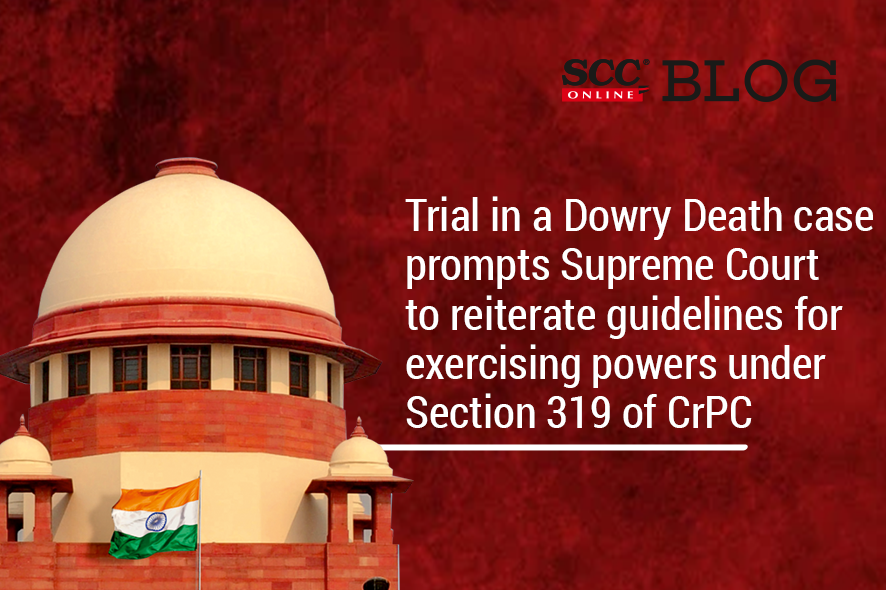Supreme Court: In a Criminal Appeal challenging the Punjab & Haryana High Court’s judgment ordering summoning of appellants as additional accused under Section 319 of Criminal Procedure Code, 1973 (‘CrPC’) while setting aside the Trial Court’s order, the Division Bench of Surya Kant* and J.K. Maheshwari, JJ. modified the High Court’s judgment sustaining the summoning of the appellant residing in the same house in a case of dowry death, while setting aside the same for other appellants due to lack of evidence of meddling with the affairs of the deceased.
The present matter relates to death of the deceased within 7 months of marriage. An FIR was registered under Sections 304-B, 498-A, 406, 323 and 34 of the Penal Code, 1860 (‘IPC’) for respondent alleging dissatisfaction of the groom’s family with the dowry given and subjecting the deceased to continuous torture and harassment. The husband and mother-in-law of the deceased are facing trial, while the investigating agency did not find any incriminating material against the other appellants (father-in-law, sister-in-law and brother-in-law).
The Trial Court at Nuh dismissed the respondent’s application for summoning the appellants as additional accused in the matter observing that the power under Section 319 CrPC ought to be exercised only if the evidence on record strongly indicates the possible involvement of persons aimed to be prosecuted. The Court also opined that the case does not hint towards the appellants committing any offence for being tried together with the two accused.
The High Court set aside the Trial Court’s order dated 12-07-2018 and ordered summoning of the appellants under Section 319 of CrPC as additional accused observing that the insinuations against the appellants were the same as the accused facing trial. The High Court viewed the existence of sufficient grounds for summoning the appellants as additional accused in the present matter. The present matter challenges the High Court’s decision.
The Court acknowledged the alleged offence to be grave and heinous in nature. It further added that “the long arms of law must find out whether any person is guilty of abetting or taking away the precious life of a young girl who met with such a tragic end soon after her marriage.” However, the Court confined itself to considering whether there is sufficient evidence against the appellants for summoning them as additional accused.
The Court referred to the decision of Constitution Bench in Hardeep Singh v. State of Punjab, (2014) 3 SCC 92 laying for broader understanding of ‘evidence’ and application of Section 319 during inquiry to be taken in its correct perspective, to be exclusively exercised when strong and cogent evidence is available.
The Court relied on Sukhpal Singh Khaira v. State of Punjab, (2023) 1 SCC 289 wherein, the Court refreshed the guidelines to be followed by the competent court while exercising power under Section 319 of CrPC laying for summoning as additional accused if the evidence points at any person other than the accused being tried excluded in the charge sheet or trial.
The Court, through conjoint reading of the above matters concluded that the power of summoning under Section 319 of CrPC should not be exercised routinely, and the existence of more than a prima facie case is sine qua non for summoning an additional accused.
Adverting to the present matter alleging active role of appellants, the Court observed the respondent’s examination-in-chief revealing the appellant’s (father-in-law’s) demand for spending a sum of Rs 20 lakhs on the deceased’s marriage. Living under the same roof as the two accused, the Court observed that “the appellant might have to sink or swim with his son and wife.” Thus, the High Court’s order summoning the father-in-law satisfied the ingredients of Section 319 CrPC in the Court’s opinion. The Court held that the appellant father-in-law has been rightly summoned, liable to be tried along with his wife and son.
For the other two appellants, i.e., sister-in-law and brother-in-law of the deceased, the Court noticed the lack of credible evidence for connecting them with the unnatural death of the deceased, since there is no cogent evidence of the appellants residing in the same house or meddling in the marital life of the deceased. Thus, the Court found it unjust to involve the two of them in facing trial as the additional accused.
The Court sustained the summoning of the father-in-law of the deceased and set aside the High Court’s order with respected to the other two appellants, i.e., sister-in-law and brother-in-law of the deceased.
The Court directed the Trial Court to follow the guidelines extensively iterated by the Constitution Bench in Sukhpal Singh Khaira (Supra) to be followed by the Court while exercising the powers under Section 319 CrPC, as pointed below:
-
To pause the trial before passing of the order on acquittal or sentence, if evidence or application under Section 319 CrPC is filed.
-
To first decide the need or summon the additional accused and pass orders.
-
To pass order for summoning under Section 319 CrPC before proceeding further with the trial.
-
To apply its mind for trying such summoned accused separately, or along with the other accused.
-
To commence fresh trial only after securing presence of summoned accused, if joint trial is decided.
There is no impediment for the Court to continue and conclude the trial against the accused being proceeded with, if decided for separate trial of the summoned accused.
[Juhru v. Karim, 2023 SCC OnLine SC 171, judgment dated 21-02-2023]
*Judgment authored by: Justice Surya Kant.







